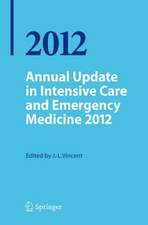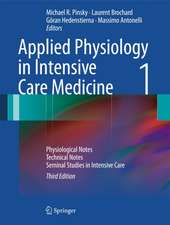Surviving Intensive Care: Update in Intensive Care Medicine
Editat de Derek C. Angus, Jean Carleten Limba Engleză Paperback – 25 noi 2003
Surviving Intensive Care, written by the world's experts in this area, is dedicated to better understanding the consequences of surviving intensive care and is intended to provide a synopsis of the current knowledge and a stimulus for future research and improved care of the critically ill.
Preț: 372.97 lei
Preț vechi: 392.60 lei
-5% Nou
Puncte Express: 559
Preț estimativ în valută:
71.39€ • 77.57$ • 60.01£
71.39€ • 77.57$ • 60.01£
Carte tipărită la comandă
Livrare economică 21 aprilie-05 mai
Preluare comenzi: 021 569.72.76
Specificații
ISBN-13: 9783540441496
ISBN-10: 3540441492
Pagini: 364
Ilustrații: XV, 344 p. 14 illus.
Dimensiuni: 155 x 235 x 19 mm
Greutate: 0.52 kg
Ediția:Softcover reprint of the original 1st ed. 2003
Editura: Springer Berlin, Heidelberg
Colecția Springer
Seria Update in Intensive Care Medicine
Locul publicării:Berlin, Heidelberg, Germany
ISBN-10: 3540441492
Pagini: 364
Ilustrații: XV, 344 p. 14 illus.
Dimensiuni: 155 x 235 x 19 mm
Greutate: 0.52 kg
Ediția:Softcover reprint of the original 1st ed. 2003
Editura: Springer Berlin, Heidelberg
Colecția Springer
Seria Update in Intensive Care Medicine
Locul publicării:Berlin, Heidelberg, Germany
Public țintă
Professional/practitionerCuprins
Natural History of Critical Illness.- Survival as an Outcome for ICU Patients.- Morbidity and Functional Limitation in Survivors of ARD.- Health-related Quality of Life.- The Neuropsychological Consequences of Intensive Care.- The Burden of Caregiving on Families of ICU Survivors.- Long-term Economic Consequences of Surviving Intensive Care.- Understanding Outcomes of Critically Ill Older Patients.- Measuring the Health Status of Pediatric ICU Survivors.- Predictors and Modifiers of Long-tern Outcomes.- Pre-ICU Factors.- Intra-ICU patient factors.- ICU Environmental Factors and Quality of Sleep in Critically Ill Patients.- The Impact of Routine ICU Supportive Care on Long-term Outcomes from Critical Illness.- Improving Methods to Capture Long-term Outcomes in Clinical Studies.- Disease-free Survival and Quality of Life as End-points in Clinical Trials.- Surrogate Measures of Patient-centered Outcomes in Critical Care.- Measuring Health Status after Critical Illness: Where Are We and Where Do We Go from Here?.- How Should We Assess Neuropsychological Sequelae of Critical Illness?.- How Can We Evaluate Information Provided to Family Members in the ICU?.- Approaches to Improve Long-term Outcomes.- How Should We Measure the Economic Consequences of Critical Illness?.- Modifying Triage Decisions to Optimize Long-term Outcomes.- Preventing Nosocomial Infections to Improve Outcome of Intensive Care.- Preventing Iatrogenic Complications.- Changing ICU Behavior to Focus on Long-term Outcomes.- L.O.V.E. and Quality of Life within the ICU: How can it improve Patient Outcome?.- Re-organizing Health Care Systems to Optimize Critical Care Outcomes.- Defining’ success’in ICU Care..
Recenzii
From the reviews:
"This sleek and modern-appearing paperback is a recent publication by Springer-Verlag, in the series Update in Intensive Care Medicine. … Surviving Intensive Care has clear typography, high-quality paper, and a strong binding … . The illustrations and tables … are clear and generally informative. … As a whole, Surviving Intensive Care is probably most of interest to clinical researchers interested in considering long-term outcomes as primary or secondary end points of observational or interventional research in the ICU." (Catherine Lee Hough, Respiratory Care, Vol. 50 (9), September, 2005)
"This sleek and modern-appearing paperback is a recent publication by Springer-Verlag, in the series Update in Intensive Care Medicine. … Surviving Intensive Care has clear typography, high-quality paper, and a strong binding … . The illustrations and tables … are clear and generally informative. … As a whole, Surviving Intensive Care is probably most of interest to clinical researchers interested in considering long-term outcomes as primary or secondary end points of observational or interventional research in the ICU." (Catherine Lee Hough, Respiratory Care, Vol. 50 (9), September, 2005)





















